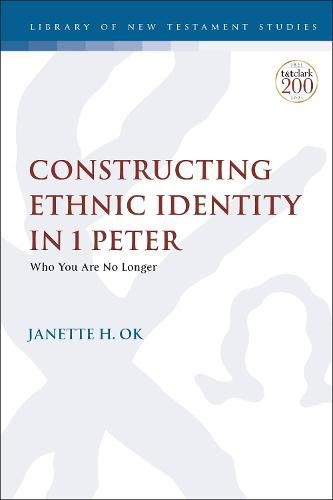Readings Newsletter
Become a Readings Member to make your shopping experience even easier.
Sign in or sign up for free!
You’re not far away from qualifying for FREE standard shipping within Australia
You’ve qualified for FREE standard shipping within Australia
The cart is loading…






Janette H. Ok argues that 1 Peter characterizes Christian identity as an ethnic identity, as it holds the potential to engender a powerful sense of solidarity for readers who are experiencing social alienation as a result of their conversion. The epistle describes and delineates a communal identity based on Jewish traditions, and in response to the hostility its largely Gentile Anatolian addressees are experiencing as religious minorities in the Roman empire. In order to help construct a collective understanding of what it means to be a Christian in contrast to non-Christians, Ok argues that the author of the epistle employs ethnic reasoning or logic.
Consequently, the writer of 1 Peter makes use of various literary and rhetorical strategies, including establishing a sense of shared history and ancestry, delineating boundaries, stereotyping and negatively characterizing the other, emphasizing distinct conduct or a common culture, and applying ethnic categories to his addressees. Ok further highlights how these strategies bear striking resemblances to what modern anthropologists and sociologists describe as the characteristics of ethnic groups. In depicting Christian identity as an ethnic identity akin to the unique religious-ethnic identity of the Jews, Ok concludes that 1 Peter seeks to foster internal cohesion among the community of believers who are struggling to forge a distinctive and durable group identity, resist external pressures to revert to a way of life unbefitting the people of God, and live as those born anew to a living hope.
$9.00 standard shipping within Australia
FREE standard shipping within Australia for orders over $100.00
Express & International shipping calculated at checkout
Janette H. Ok argues that 1 Peter characterizes Christian identity as an ethnic identity, as it holds the potential to engender a powerful sense of solidarity for readers who are experiencing social alienation as a result of their conversion. The epistle describes and delineates a communal identity based on Jewish traditions, and in response to the hostility its largely Gentile Anatolian addressees are experiencing as religious minorities in the Roman empire. In order to help construct a collective understanding of what it means to be a Christian in contrast to non-Christians, Ok argues that the author of the epistle employs ethnic reasoning or logic.
Consequently, the writer of 1 Peter makes use of various literary and rhetorical strategies, including establishing a sense of shared history and ancestry, delineating boundaries, stereotyping and negatively characterizing the other, emphasizing distinct conduct or a common culture, and applying ethnic categories to his addressees. Ok further highlights how these strategies bear striking resemblances to what modern anthropologists and sociologists describe as the characteristics of ethnic groups. In depicting Christian identity as an ethnic identity akin to the unique religious-ethnic identity of the Jews, Ok concludes that 1 Peter seeks to foster internal cohesion among the community of believers who are struggling to forge a distinctive and durable group identity, resist external pressures to revert to a way of life unbefitting the people of God, and live as those born anew to a living hope.